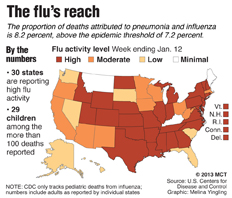As influenza season peaks, students advised to get vaccinations

Influenza activity has increased this year, with forty states reporting moderate-to-high levels.
The flu has run rampant this season, and statistics from the Center for Disease Control, CDC, report that 130 million vaccine doses have already been administered.
Flu season is said to peak in January and February. Currently, Texas is one of 24 states reporting high influenza-like illness activity, according to the CDC.
For most healthy young adults, getting the flu means missing classes or work while being confined to your bed; however, for some people — especially senior citizens and infants — catching the flu can mean hospitalization and can even cause death.
St. Edward’s University junior Margot Salsman and senior Lupita Hinojosa both had the flu this season. Neither received a flu shot prior to their diagnosis.
“My parents never really enforced it,” Hinojosa said. “My mom … claimed the shot itself would give us the flu.”
The CDC claims that similar misconceptions about the shot are more common than not and recommends that everyone at least consider getting a flu shot to protect against the virus.
CDC statistics from years past show flu shots to be 60 to 70 percent effective at preventing strain A of the virus, though completely ineffective against a certain strain B. It seems to be a betting game, though the stakes are your health. It is also possible to still get the flu after getting a flu shot, according to the CDC.
Both Salsman and Hinojosa reported experiencing similar symptoms.
“[I feel] fatigued and achy all the time. It is hard to sleep [because of] lots of coughing and throat issues,” Salsman said, who has been fighting a cough for six weeks.
“My body aches, my eyes feel heavy and my throat feels like sandpaper,” Hinojosa said. “At night, I lose sleep because I have to blow my nose every 10 minutes or I get cough attacks.”
If you think you have the flu, getting the shot will do nothing to help your symptoms, but the CDC still recommends getting the shot. Getting a flu shot even though you have the flu is important because “[it is] possible that your illness was not caused by an influenza virus … [and] even if you were sick with one influenza virus, the seasonal flu vaccine protects against three types of flu viruses, [meaning] the vaccine can offer protection against other influenza viruses you have not been exposed to yet,” according to the CDC website.
If you think you have the flu, it is in your best interest — as well as the interest of your fellow students, the faculty and staff — to not go to class so as to avoid further spreading the virus. This might prove difficult if professors take strict attendance.
“I [have] only missed one of my classes, and my professor was very understanding,” Hinojosa said. “All the other classes I went to … I would have to step out when I would get cough attacks or when I had to blow my nose … I even ostracized myself [by] sitting away from everyone because I did not want to get anyone else sick.”
For those on campus who have yet to get the flu and are concerned about avoiding it, the St. Edward’s Health and Counseling Center provides flu shots.
“If the student has the student health insurance, [the flu shot] is free because we can bill the insurance company … Otherwise, the charge is $20,” Kim Yeager, a nurse at the Health and Counseling Center, said.
Both the Health and Counseling Center’s doctors and the CDC have recommendations for flu-stricken students.
“Students with the flu should not go to class or public events until they are fever-free for 24 hours without taking fever-reducing medications,” Yeager said.






